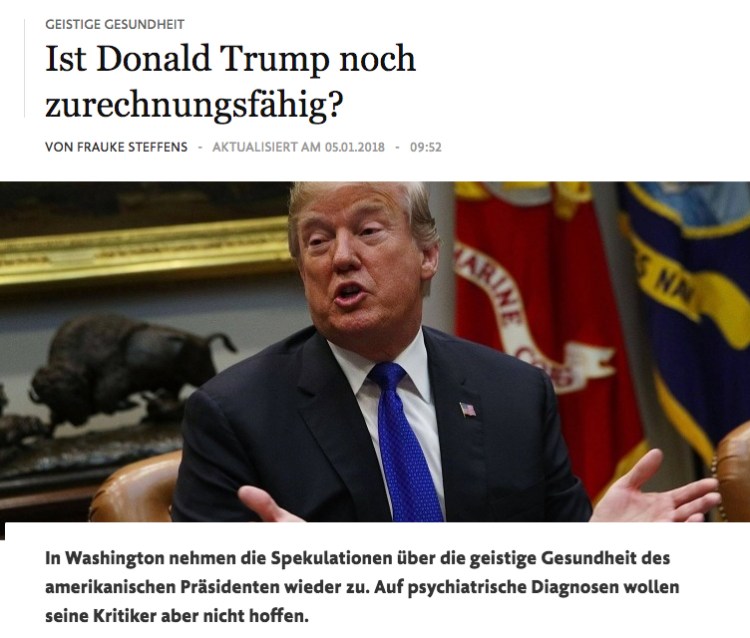BERLIN — European commentary on President Trump is rarely flattering, but the cascading revelations alleged in Michael Wolff’s tell-all book “Fire and Fury,” drew an especially fierce response from a horrified continent.
“Is Trump still sane?” asked the Friday lead headline on the site of Germany’s most respected conservative paper, Frankfurter Allgemeine Zeitung. The piece was published under the topic “mental health.”
Meanwhile, British readers woke up to the Times of London’s main front page headline that also wondered about the president’s stability: “Trump’s mental health questioned by top aide.”
“Donald Trump’s right-hand man openly questioned his fitness to serve and predicted that he would resign to avoid being removed by his own cabinet, according to a book that the US president tried to block yesterday,” wrote the Rupert Murdoch-controlled Times of London.
For its part, France’s paper of record, Le Monde, just described the book as “haunting.”
Trump has never been too popular in Western Europe, with approval ratings in many countries hovering in the single or lower double digits. But even though disagreement with Trump has almost become the norm here, some of Friday’s public responses to Wolff’s book still appeared unprecedented.
The Times of London and the Frankfurter Allgemeine Zeitung are some of Europe’s most renowned news outlets, and both pride themselves with having especially influential readers in business and government in their respective countries where conservative parties are currently in power. More so than in the United States, European papers frequently mix traditional reporting and editorials on front pages – often helping to sway public opinion, and by extension governmental strategy, as well.
A degree of skepticism over the mental health fears prominently featured in Europe on Friday is certainly warranted, especially given that my colleagues have pointed out several possible flaws of Wolff’s book and previous accusations against the author over alleged inaccuracies in his reporting.
But these fears are still damaging the world’s perception of Trump and the United States. Some of the United States’ closest international allies, including Britain, Germany and France, are now openly debating whether the most powerful man in the world and de-facto leader of NATO – an alliance on which their entire military strategies are based – can still be trusted.
“In many European capitals, the prevailing sentiment is helplessness and frustration that Trump won’t engage in a rational dialogue,” argued Stephan Bierling, a professor for transatlantic relations in Germany, who said that he had long admired the United States but that his beliefs were now “shaken to the core.”
“Once a relationship is in disorder there is no easy way back. Trump has succeeded at destroying Europeans’ trust in himself and the United States more broadly,” according to Bierling. The mental health concerns now raised in Wolff’s book and widely debated across Europe, he said, were exacerbating European politicians’ existing skepticism of Trump.
In Germany, Trump’s unpredictable outbursts of anger have already played into the hands of those long demanding normalized relations with Russia, despite its annexation of Crimea and election meddling abroad. The chorus of voices demanding an end of sanctions against Russia are growing.
Moscow has had a strong lobby in Berlin for years and doubts over Trump’s reliability could now become one of their strongest arguments. Unsubstantiated claims alone would likely not force the German government to turn its back on the United States, but the allegations made in “Fire and Fury” appear to confirm what everyone has long suspected. Already a year ago, Sigmar Gabriel, Germany’s then-vice chancellor and now-foreign minister called Trump “a threat.” At the time, his remarks found little echo in the United States, even though they expressed a more widespread fear among European government representatives.
French President Emmanuel Macron had recently established a more extensive working relationship with Trump than the Germans were able to, but he also voiced an unusually stern warning this week, arguing that Trump’s policies could result in a war. Referring to Trump’s Iran approach, he said: “The official line pursued by the United States, Israel and Saudi Arabia, who are our allies in many ways, is almost one that would lead us to war.” His remarks came before excerpts from “Fire and Fury” emerged.
In Britain, a country which usually prides itself for having a special relationship with the United States, enthusiasm for that deep intertwinement has remarkably weakened over the last year, too. A scheduled Trump state visit to Britain was delayed and might never happen. And Prime Minister Theresa May publicly rebuked Trump after he retweeted videos shared by a far-right group in the country.
“This isn’t a crisis Europeans will simply sit out,” said Bierling, the German transatlantic relations professor.
“Even once Trump is gone, the damage to the transatlantic alliance is almost irreversible now. There is no easy way back,” he said.
Send questions/comments to the editors.



Success. Please wait for the page to reload. If the page does not reload within 5 seconds, please refresh the page.
Enter your email and password to access comments.
Hi, to comment on stories you must . This profile is in addition to your subscription and website login.
Already have a commenting profile? .
Invalid username/password.
Please check your email to confirm and complete your registration.
Only subscribers are eligible to post comments. Please subscribe or login first for digital access. Here’s why.
Use the form below to reset your password. When you've submitted your account email, we will send an email with a reset code.